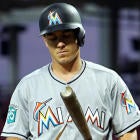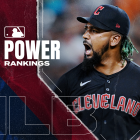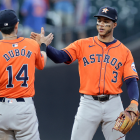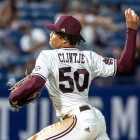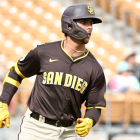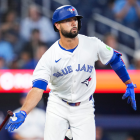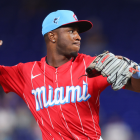The moribund Marlins lost more games than any other National League team in 2018. Opponents outscored them by a mind-boggling 220 runs. Watching former members of the Marlins' best outfield in baseball made matters worse; Christian Yelich surging to MVP heights and Giancarlo Stanton hitting bombs in the Bronx only rubbed salt in the wound.
Still, this is typical fare in today's game, where tanking hard has become acceptable practice for front offices, with fans daydreaming of results that mirror what the 2016 Cubs and 2017 Astros accomplished after hitting rock bottom. If anything, the Fish will likely sell off a few more veterans before any potential turnaround can begin in earnest.
The bidding will likely start with All-Star catcher J.T. Realmuto. The 27-year-old backstop led all major league catchers in Wins Above Replacement by a wide margin, batting .277/.340/.484, slamming 21 homers, playing plus defense, and running the bases better than any catcher in the league (by far). With two years of team control left and a projected arbitration figure around $7 million for the coming season, Realmuto is a blue-chip trade asset who has already attracted the attention of multiple catcher-needy teams.
Among the many potential suitors for Realmuto, the Astros stand out as both motivated buyers a year removed from their first-ever World Series win, and a team sorely lacking major league-caliber catchers with incumbents Brian McCann and Martin Maldonado both headed to free agency. They're also well equipped to swing a deal, given their stockpile of pitching prospects, even beyond top young hurler Forrest Whitley. High-upside pitchers would seem a must in any potential deal for Realmuto, given the state of the Marlins' major league staff following the 2016 death of young ace Jose Fernandez. Miami ranked last in the majors in both park-adjusted ERA and park-adjusted fielding independent pitching in 2018. This being the Marlins, optimism must be tempered: Realmuto's agent recently declaring that his client won't sign an extension to stay with the Marlins doesn't exactly help Miami's ability to negotiate a perfect trade.
Though the Marlins do have other theoretically marketable veterans, it's tough to know exactly how much those players might fetch in return.
- 2018 Result: 63-98, last place in NL East
- Key free agents: None
- Needs: Everything
Second baseman Starlin Castro has an All-Star pedigree in his own right, having made the Midsummer Classic roster four times. He rated right at league average both offensively (.278/.329/.400) and defensively this past season and played in 154 games; league-average players can be valuable for teams with gaping holes at a given position. But Castro's also due to make nearly $12 million in 2019 (with a club option for 2020), so it's hard to see a contender giving up more than B-level prospects for him. Same goes for Martin Prado (formerly a solid bat but now 35 years old, injury-prone and coming off a lousy season) and veteran left-hander Wei-Yin Chen (oft-injured with below-average results in each of his three seasons as a Marlin, and making a stupefying $20 million next year). The Fish could try to cash in on productive players like Derek Dietrich (.265/.330/.421 in 2018) and Drew Steckenrider (74 strikeouts in 64 2/3 innings), but optimism will be tempered until Miami's (relatively) new brain trust shows it can do better than the 47 cents on the dollar it got for Yelich right before he pulverized the entire league.
One of the most subtly interesting deals of the Bruce Sherman/Derek Jeter era was the trade of hard-throwing reliever Kyle Barraclough to division rival Washington just a few days after the end of the 2018 regular season. The price tag appeared light at first, with Miami getting $1 million in international bonus-pool room, but not actual players in return.
The Marlins had bigger ambitions than a bench jockey's salary, though. Armed with that cash infusion, Miami signed top Cuban outfield prospect Victor Victor Mesa, as well as his 17-year-old younger brother Victor Mesa Jr. Scouts say the elder Mesa in particular has the potential to one day become an impact player in the big leagues.
Beyond that, the focus is on figuring out which current members of the Marlins organization could end up becoming part of the next winning team in Miami. Third baseman/outfielder Brian Anderson fared well in his first big league season in 2018 and has already locked up a starting job for the spring. Every one of the other 24 Opening Day roster spots could end up flipping between now and April, though the Marlins will likely give whifferific outfielder Lewis Brinson a long leash after watching him flop when he came over from Milwaukee in the Yelich deal.
As heartening as it's been to watch teams like last season's A's, Braves, and Phillies suddenly rise up and become contenders, don't expect Miami to get back into the mix until some time next decade.









